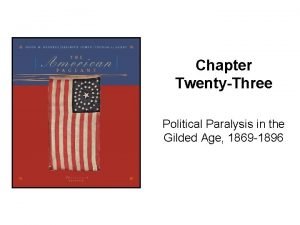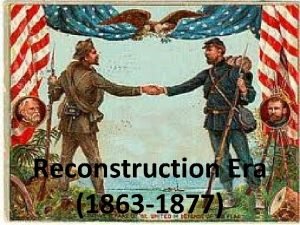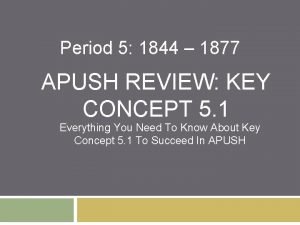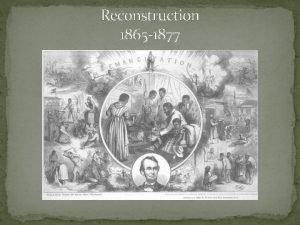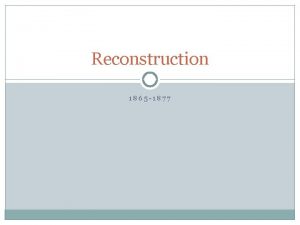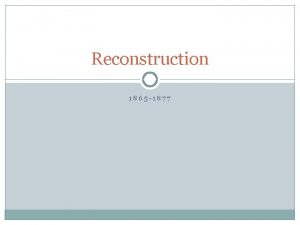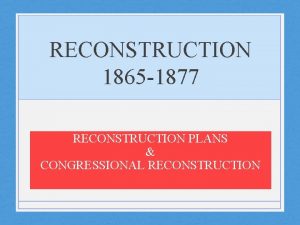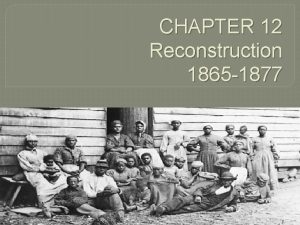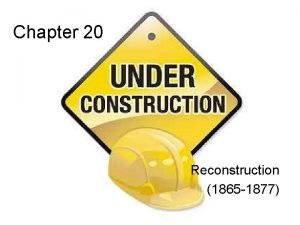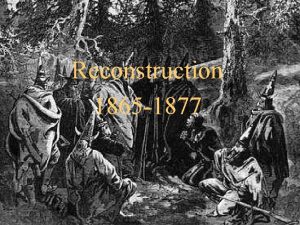THE IMPACT OF RECONSTRUCTION RECONSTRUCTION 1865 1877 a













- Slides: 13

THE IMPACT OF RECONSTRUCTION

RECONSTRUCTION 1865 – 1877 a complete make over of the South into a free labor economy with an equal rights social structure A variety of proposals were created to accomplish this goal President Lincoln’s 10 % The Wade-Davis Bill (moderate Republicans in Congress) President Johnson’s Plan The Military Reconstruction Act

President – Abraham Lincoln Congress – Wade-Davis Bill Proclamation of Amnesty and Reconstruction – 1863 Moderate Republicans wanted compromise Reconcile North and South – NOT punish Former Confederate states can rejoin the Union when: 1. 10% of a state’s voters take an oath of loyalty to the US and accept the end of slavery 2. Reorganize state governments 3. Each state abolishes slavery 4. NO Confederate government officials or military officers, judges or members of congress who left can vote or hold office Lincoln is too easy, Radical Republicans are too harsh Former Confederate states can rejoin the Union when: 1. The majority of the adult white men take an oath of loyalty to the Union 2. State holds a constitutional convention to create a new state government 3. Attendees of the conventions take an “ironclad” oath that they had never fought against the Union or supported the Confederacy. 4. Each state abolishes slavery 5. Rejects all debts owed by the Confederacy 6. NO Confederate government officials or military officers can vote or hold office

President – Andrew Johnson Congress – Radical Republicans Lincoln’s VP – a southerner (TN) Restoration Program – a new Proclamation of Amnesty (very similar to Lincoln’s plan) Led by Thaddeus Sevens (PA) and Charles Sumner of (MA) Former Confederate states can rejoin the Union when: 1. Pardon all former citizens of the Confederacy who took an oath of loyalty to the Union 2. NO Confederate government officials or military officers may vote or hold office but may appeal personally to the President for a pardon 3. Write a new state constitution 4. Elected a new state government 5. Repealed the act of secession 6. Canceled all war debts 7. Ratify the 13 th amendment – abolishes slavery (makes it illegal to own slaves) Did NOT want to reconcile with the South Punishment Former Confederate States can rejoin the Union when: 1. Accepted the Freedman’s Bureau – provides aid to blacks and whites throughout the South (food, medical care, arrange wages, working conditions, schools, etc. ) 2. 14 th amendment – grants citizenship to all persons born in the US and grants equal protection under the laws (can not treat one group of citizens as less equal than others) 3. Military Reconstruction Act 4. Confederates were NOT allowed to vote 5. Needed new state constitutions made up of loyal citizens (black and white) redo all the work of

JOHNSON VS. CONGRESS Laws proposed by radical republicans in Congress were vetoed by Johnson Civil Rights Act of 1866 and Extending the Freedman’s Bureau Congress used the 2/3 override to make them laws anyway now control Reconstruction Limit the President’s power Command of the Army Act – limits the president’s control over the armed forces Tenure of Office Act – the President can not fire federal officials without the Senate’s consent Johnson declares these unconstitutional deliberately fires someone Congress impeaches Johnson

CONGRESS REBUILDS THE SOUTH Military Reconstruction Act 1867 Divided the south into 5 military districts Each governed by a general and supported by federal troops Army begins registering new voters Confederate soldiers and government officials are denied the right to vote New Groups of Voters Freedmen – former slaves Joined the Republican Party – Lincoln and Emancipation Southern whites who opposed the war seen as traitors by traditional southern democrats scalawags Northerners who moved south often took advantage of desperate southerners carpetbaggers

CONGRESS REBUILDS THE SOUTH Election of 1868 Republican candidate = Grant supported Reconstruction and protection of African American rights Democratic candidate = Seymour supported ending Reconstruction and restoring the leadership of the Old South Grant is elected with the help of ½ million black voters … lesson to be learned , to keep control of the Government the Republicans need the support of African-Americans

CHANGES FOR AFRICANAMERICANS Positions in government 1/4 of delegates who re-write state constitutions 1/5 of new representatives to new state governments 20 House of Representatives members and 2 Senators Violence Whites refused to allow new black officials to take their seats Started secret societies like the Ku Klux Klan (KKK) Used to intimidate African-Americans out of political life Wore hooded robes, worked at night Threatened voters, politicians and anyone who challenged white authority Beaten, tar and feathered, destroyed property, murdered (lynching) Troops were used to protect African Americans and uphold anti-violence laws Most trials were NOT effective – juries were afraid to testify against whites or Klan members or become

WORSE THAN SLAVERY? Sharecropping Most former slaves only knew farm work but had no money to buy their own farms Plantation owners needed farm laborers Divide plantations into smaller plots that are rented to tenant farmers Must pay rent to live and farm the land (still belongs to the owner) Rent in cash or a share of the crops grown 1/3 to ½ Sounds like a great plan! BUT… Most freed slaves had to borrow money from the plantation owners for start up costs Seeds, tools, food to live on until harvest, etc. Few earned enough money from the harvest to pay rent AND debt Creates a cycle of poverty

Leaving the South Push factors – segregation, racism and poverty Pull factors – opportunities and equal treatment Northern cities competing for jobs with immigrants. Still encounter racism and segregation (just not protected by law) West cowboys and Indian fighters (buffalo soldiers) Most remained in the South Established strong family, church and community ties Build own schools and colleges Entrepreneurs 2, 000 25, 000 businesses owned by Freedmen

THE BEGINNING OF THE END 1870 all states had rejoined the Union New Republican state governments were plagued with corruption Start rebuilding infrastructure with federal money Roads, bridges, railroads, schools, hospitals, cities Raised taxes in the South 400% 1872 Northerners were losing interest in Reconstruction “let the south alone” Amendments, construction projects, new state governments … our work is done Amnesty Act 1872 – allowed former confederates to vote democrats quickly take over southern state governments

REVERSING RECONSTRUCTION Most Southerners bitterly resented the “Yankee” governments forced on them, have a dream of the “New South” Mills, factories, cities But most southerners (black and white) were stuck in poverty Democratic party is made up of the wealthy planters of the pre-war “old south” Southern democrats work hard to keep things from changing Black Codes, Jim Crow Laws Support segregation of blacks and white Plessy v. Ferguson legalizes segregation as long as facilities are “separate but equal” Democrats in state governments start cutting funding for Freedmen’s Bureau and public schools Kept African-Americans from voting Poll tax The 15 th amendment: citizens can not be denied the Literacy test right to vote because of race Grandfather clauses

END OF RECONSTRUCTION Election of 1876 Tilden (Dem) vs. Hayes (Rep) First election with reconstructed southern states Tilden wins the popular vote and 184 electoral votes (185 needed to win) Congress (dominated by republicans) calls a commission to decide 20 disputed votes Decided all electoral votes go to Hayes Questionable? !? Compromise of 1877 Democrats accept the commission’s decision and Hayes wins the presidency Hayes withdraws all federal troops out of the South
 Whats the compromise of 1877
Whats the compromise of 1877 1877 golden 1
1877 golden 1 Great railroad strike of 1877 significance
Great railroad strike of 1877 significance Compromise of 1877
Compromise of 1877 Tanssija 1877-1927
Tanssija 1877-1927 Georgia history timeline 1877-1919
Georgia history timeline 1877-1919 The key tradeoff featured in the compromise of 1877
The key tradeoff featured in the compromise of 1877 Gilded age union strikes
Gilded age union strikes Define reconstruction era
Define reconstruction era Haymarket square riot apush
Haymarket square riot apush Whats the compromise of 1877
Whats the compromise of 1877 The gilded age 1877 to 1898 worksheet answers
The gilded age 1877 to 1898 worksheet answers Compromise of 1877 apush
Compromise of 1877 apush The rise of industrial america 1865-1900
The rise of industrial america 1865-1900






